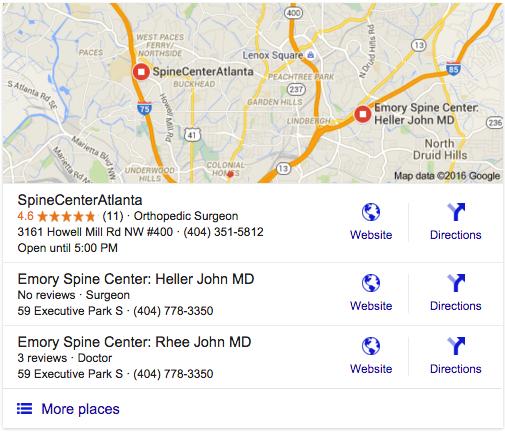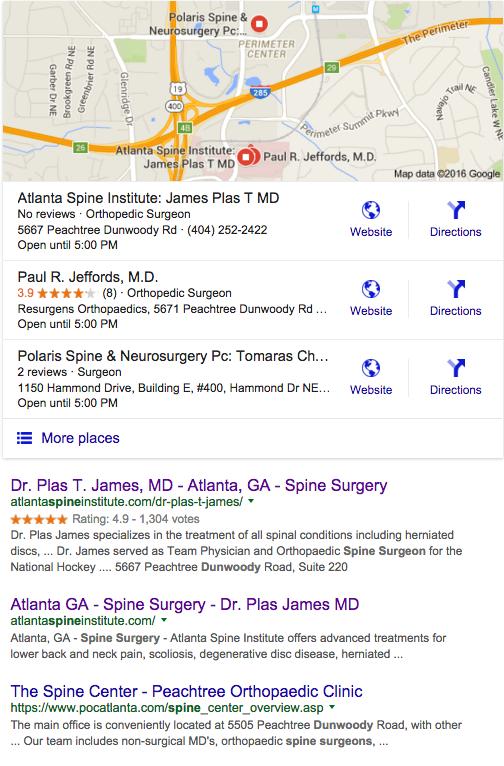The three rules of real estate are: location, location, and location. Apparently Google believes this as well. Google is now penalizing you, or rewarding you, based on your practice address. Google My Business maps (known as the Three-Pack) are now at the top of localized Google search results and one that can knock you out of the results for your service line.
Since Google first launched, SEO and marketing companies have claimed they can get you in the first position of the first page of Google search results. They did this by knowing the search metrics Google looks for, and adding keywords to meet those metrics. The common wisdom said if you had "Spine Surgeon Atlanta " as part of your title, part of your meta data, and part of your content, then you would most likely show up for that term. And this was true, for the most part, until recently.
One of our clients, Dr. Plas T. James, has enjoyed being on the first page of Google for the phrase "Spine Surgeon Atlanta". Today, the first three results are SpineCenter Atlanta, Emory Spine Center: Heller John MD, and Emory Spine Center: Rhee John MD. These results are all encased in a Google My Places box with a small map at the top of the box, and three listings with a "More places" button at the bottom. The traditional search results are now located BELOW this box. If you're on a standard laptop, this means the results are now "below the fold", or off screen! Dr. James is still high on the standard search results, but further down than we'd like.
results are SpineCenter Atlanta, Emory Spine Center: Heller John MD, and Emory Spine Center: Rhee John MD. These results are all encased in a Google My Places box with a small map at the top of the box, and three listings with a "More places" button at the bottom. The traditional search results are now located BELOW this box. If you're on a standard laptop, this means the results are now "below the fold", or off screen! Dr. James is still high on the standard search results, but further down than we'd like.
What magic did SpineCenter Atlanta and Emory do to get the top spot? They met one or more of Google's three criteria for ranking of local results: Relevance, Distance, and Prominence.
• Relevance takes all of the traditional search metrics - keywords, titles, meta data, and a host of other metrics - and scores your site based on how it applies to the search term.
• Distance, is relevant to the term you used in your search. In our query for "spine surgeon atlanta", Google decided we meant near the geographical center of Atlanta, and factored that in.
• Prominence is theoretically both online and offline factors. Links to your website, how long its been around, mentions of you and your website in articles online, as well as offline fame. Emory is a well known university, so Prominence factors heavily in its favor. Spine Center Atlanta is located near the center of Google's search calculation, so it got featured.
And the two doctors pulled from Emory and prominently featured? Pure luck. In fact, these doctors haven't claimed these Google My Business profiles shown in the Three-Pack. You can tell because their names are backwards in the results and, when clicked, Google has a link prompting you to "claim this business".
If Google were really focused on distance, it would have used the State Capitol of Georgia, which is the exact geographical center of Atlanta and featured those doctors nearby. But this combination of Relevance, Distance, and Prominence now works against doctors who might live near the center of a search, but haven't optimized their web presence. Our client, Dr. James, is still near the top of search results but isn’t in the first three positions where are now occupied by maps.
When we search for "Spine Surgeon Dunwoody", Dr. James is first in the Google My Business map results, as his office is technically just outside the core Atlanta area as determined by Google, as well as in the first position of true search results. So how is Dr. James supposed to draw patients from a wider area and market to them effectively?
core Atlanta area as determined by Google, as well as in the first position of true search results. So how is Dr. James supposed to draw patients from a wider area and market to them effectively?
The answer came in the mail Friday. It was a mailer (paper!) from Google. I actually received two, one for me (I'm considered a business, just like you), and one for my actual business. The nice card inside reads "How to get your business to show up on Google". And when you open up the card the answer is "Run an Ad".
Coincidence that the traditional SEO results have been pushed down, and a massive ad campaign from Google has begun? I don't think so. Google is now making it more difficult for you to market to patients outside of your exact location (as perceived by Google) through a pure optimized strategy. If you want to show up in metro searches, fire up the checkbook and get those Pay per Click dollars running.
There are other steps you can - and should - take to show up in the top of localized search results:
• Make sure you have your address on your website. A graphic of your address doesn't count; it must be actually text you can select.
• Use a consistent format for your address. Google doesn't use Suite, Ste, or anything other than a pound (#) sign for secondary addresses. You aren't required to do this, just be consistent.
• Make sure everything about you online has this exact address. Check rating sites and update them. Check directories and update them. Check your NPI listing and update that.
• If you have more than one location there are extra steps you need to take. More on that in a future article or contact us at info@voxmd.com for a free review.
• Look at the map for your city and state in Google and click the Map link. You will see a pink outline of what Google considers your area. Like Dr. James, who is in the Atlanta Metro Area but practices in Dunwoody according to Google, you may be considered outside of the city area as you understand it.
To assess the damage to your practice by the Google Three-Pack and create a plan to fix it, feel free to ask us for an assessment at info@voxmd.com, or follow these steps:
• Open a new window and make sure you are NOT logged in to Gmail.
• Search for yourself in the following two formats: “city, state specialty” AND “specialty city, state”.
• Use variations of city and state. If you are in New York City, use New York, NYC, and Manhattan. You want to use terms people in your area use to ensure your showing up where you are actually located. You also want to check if you show up in other areas nearby. Google recognizes neighborhoods as well if they are well known. Tribeca is recognized, Germantown is not because there are thousands of them.
• Use variations of your service line such as “orthopedic, spine, back” combined titles such as "surgeon, surgery, doctor, specialist”.
• Look at the Google search suggestions as you type. Google will drop down a list of recommendations, and these are based on use. If they show up, it means they're being used and Google likes the terms better than what you're typing.
• As your results show, write down the search parameters you used and whether you show up or not in the maps. In some instances, there won't be maps shown.
• Also note whether you are in the search results below the maps!
You need to know how this Google change has affected you. It may be for the best, or it may be for the worst. You can optimize your online presence to ensure you show up or you may need to consider investing in a paid search campaign.
Dick Pepper is President of VoxMD, a medical marketing and technology company, and creator of PracticeRate, a reputation management and marketing tool. Visit VoxMD at http://voxmd.com, and feel free to ask questions at info@voxmd.com.

